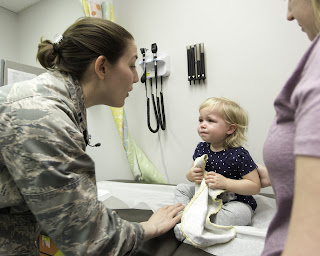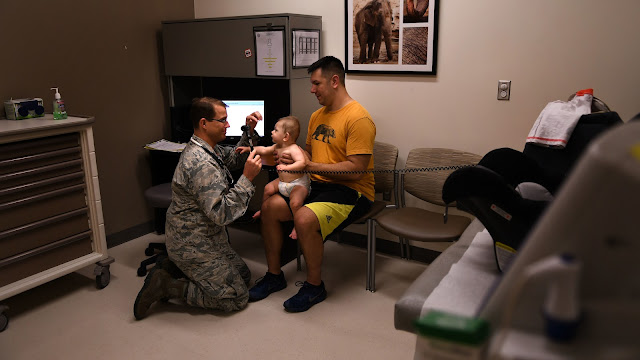5 Questions: What’s It Like to Work as a Pediatrician?
By Ian Neligh
 |
| Navy Lt. Cmdr. (Dr.) Sebastian Lara, an assistant professor and clerkship director in the Department of Pediatrics at USU, has worked in pediatrics for nine years. (Photo credit: Tom Balfour, USU) |
Department: Pediatrics
Title: Assistant Professor and Clerkship Director, Department of Pediatrics, F. Edward Hebert School of Medicine, Uniformed Services University of the Health Sciences
Years in Pediatrics: 9 years
Favorite Accolade: Outstanding Young Pediatrician of the Year, American Academy of Pediatrics Section on Uniformed Services
Best Qualities of a Pediatrician: Sense of humor, attention to detail, flexibility, patience, communication extraordinaire, advocate
Military Highlight: Deployed with the Navy’s Pacific Partnership 2018 aboard USNS Brunswick working alongside the military and healthcare teams of seven countries and islands in the Pacific Ocean
A. The patients! By the nature of taking care of young people, the efforts you put in for your patients are magnified 100 times. For example, I always think of one of my patients who was incredibly sick with cancer, being close to dying on more than one occasion. The work the pediatric team put into her care paid off, and she went on to obtain her degree in social work. Over the course of her career, she will use her skills, experience, and empathy to directly help thousands of other people. That’s a powerful thing.
The other day-to-day preventive care we give kids and adolescents may not be as dramatic, but when you think about the power of preventing one serious illness with a vaccine, preventing one severe injury with a helmet, or giving coping skills for mental health – the effects over a long lifetime are truly tremendous. Makes me excited to go to work every day!
A. Do you remember your childhood pediatrician? I do! A lot of people fondly recall going to their childhood doctor for regular check-ups. As pediatricians, this outpatient care is a cornerstone of what we do, and it can be a highlight, watching patients grow up from being infants to heading off to college or military service.
 |
| Every year, roughly 8 to 12 percent of the physicians graduating from USU become pediatricians. (U.S. Navy photo by Jacob Sippel, Naval Hospital Jacksonville/Released) |
What makes a military pediatrician so unique is that we often cover all of these roles at once — inpatient and outpatient, sick and well, general and specialized care. In remote duty locations, like Guam where I was assigned for three years, we rely on our training to handle the full spectrum of pediatric care. In the course of one day, I would run from the delivery room helping a baby take their first breath to the emergency room to diagnose and treat a young child with persistent fevers; then to the clinic to counsel a teenager who has come to trust me after several visits. I love the variety — it’s exhilarating and very fulfilling.
The beauty of the military system is that even in areas where the resources are scarce and you are pushed to be the best physician you can be — the full support of the large hospitals and specialists were only a phone call away.
A. When I tell strangers that I’m a pediatrician in the military, many ask why we would even need them. In a big city like Washington, D.C. it’s a fair question because there are certainly other pediatricians around. But it only takes one second of being at a smaller duty station to realize how critical pediatrics is to the mission. And that is because families are critical. If we are asking our young service members to spend a few years in places like Guam, Korea, Alaska, they will perform at their best and have peak readiness when their families are near them and with the knowledge that their families are being taken care of by the best.
Additionally, children are disproportionately affected by combat and humanitarian crises, and so military pediatrics is directly needed for this big part of our mission. What I noticed on my humanitarian deployment: no matter what nationality or culture, people’s top priorities include for their children to be healthy and happy! So pediatrics offers a universal connection that the military medical community can make across the world.
A. In addition to having the best patients, I love the people I work with! Pediatricians are extraordinary communicators and advocates. We by default get the bonus of really having two patients: the child and their parents/caregivers. The skill of being able to explain an upcoming treatment to a nervous parent and in the next breath being able to explain it to a nervous four-year-old means pediatricians need to be flexible and have an extremely high emotional intelligence. This makes for fantastic colleagues.
Also, some of our patients can’t speak up for themselves, so pediatricians are charged with being an advocate for them on a small scale every day in clinical encounters and on a big scale with military and national policy. It means pediatricians are usually passionate people and that is inspiring to be around.
Q. What advice can you offer students considering this specialty?
A. Medical school is the best time to explore! We have to decide on a specialty crazy quick in my opinion, so take advantage of seeing a wide variety. You have the rest of your career to focus on one particular aspect of medicine, so take that elective in a specialty that might seem completely opposite. It will make you a well-rounded physician, which we really need in the military! If interested in Peds, ask your faculty – each of us has a unique experience and would be happy to share.






